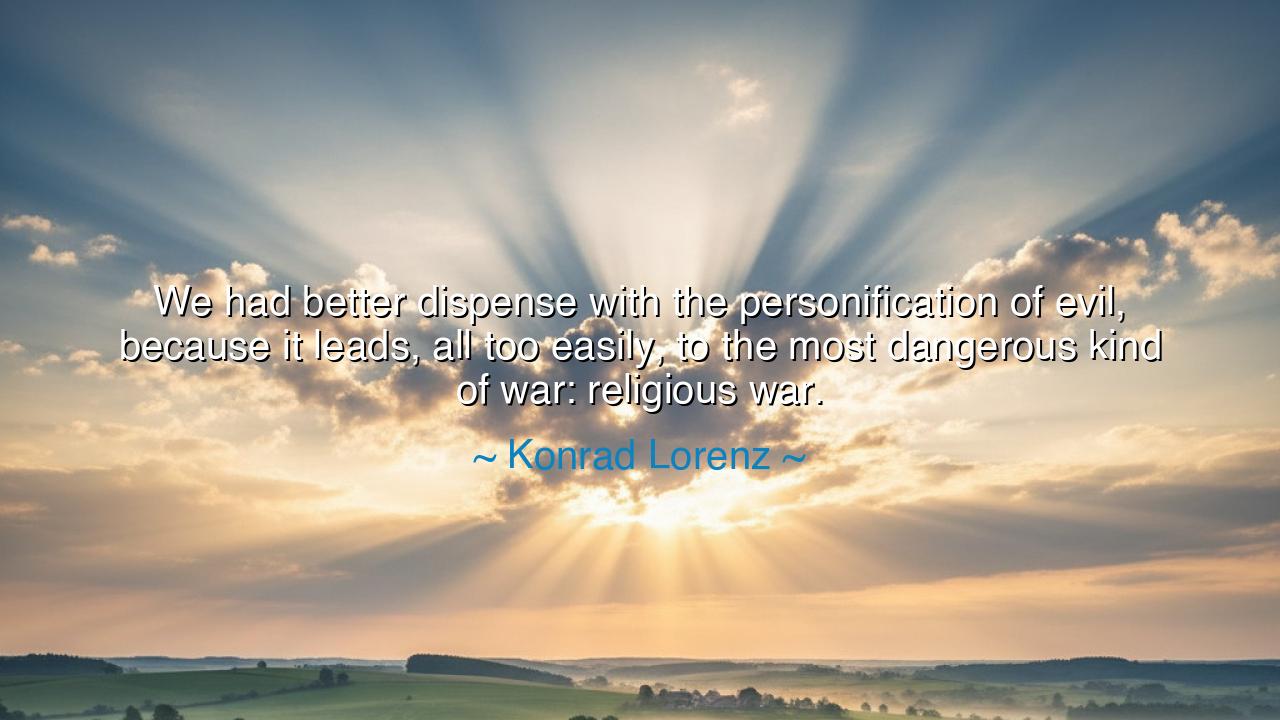
We had better dispense with the personification of evil, because
We had better dispense with the personification of evil, because it leads, all too easily, to the most dangerous kind of war: religious war.






Hear the voice of Konrad Lorenz, a thinker of humanity’s nature, who warned: “We had better dispense with the personification of evil, because it leads, all too easily, to the most dangerous kind of war: religious war.” These words are like fire on the tongue, for they reveal the peril of turning human conflict into cosmic struggle. When men cease to see their enemies as fellow mortals, and instead paint them as demons, then all restraint is lost, and the blood spilled becomes sanctified as holy.
The personification of evil is as old as myth itself. In every age, kings and priests have named an adversary not merely wicked in deed, but evil in essence. To fight such a foe was not seen as war between men, but as war against darkness itself. And here lies the danger, for when a foe is called “evil incarnate,” no mercy can be shown, no compromise sought. In the fires of zeal, the human face of the enemy vanishes, and what remains is only a shadow to be destroyed.
This is why Lorenz warned of religious war, the most terrible of all wars. For when men fight over land, borders, or power, there is at least room for treaty and truce. But when they believe they fight on behalf of heaven, then the sword cannot be sheathed until one side is utterly crushed. The Crusades stand as testimony: armies marched across continents, not for survival alone, but to cleanse the world of infidels. Villages burned, innocents slaughtered, and the soil of Jerusalem drank the blood of countless thousands—all because men believed themselves to be soldiers of God rather than children of earth.
Consider, too, the story of the Thirty Years’ War in Europe. What began as a struggle between Catholics and Protestants grew into one of the longest and most destructive conflicts the continent had ever known. Whole regions were emptied of life; famine and plague followed the sword. All this devastation was justified by both sides in the name of righteousness, as if God Himself had chosen them as His avengers. But in truth, it was not heaven’s will, but human pride, fear, and hatred clothed in the garments of faith.
The meaning of Lorenz’s words, then, is not to deny the existence of evil, but to caution us against embodying it in nations, peoples, or creeds. For evil is not a tribe or a religion—it is the cruelty, greed, and blindness that can dwell in any human heart. When we project it outward, personifying it in others, we blind ourselves to the truth that the same darkness lurks within us. To declare others as “evil itself” is to absolve ourselves of reflection and to open the gates to endless, merciless war.
The lesson is that true wisdom lies in humility. We must resist the temptation to see our opponents as devils, and instead recognize them as men and women, as flawed and fallible as ourselves. We must separate deeds from essence, condemning wrong actions without damning entire peoples. For only in this way can peace remain possible, and dialogue remain open.
What, then, must we do? We must guard our speech, for words have power to enflame hearts. Let us never call others monsters or demons, but instead hold fast to the truth of their humanity. We must teach our children that the enemy is not to be dehumanized, but understood. We must labor to resolve conflict with justice, not zealotry, and to remember always that the greatest wars are born not of necessity, but of hatred sanctified as holy.
Therefore, let Lorenz’s warning be carried forward: do not personify evil, lest you make war endless. Remember that the true battle is not against flesh and blood, but against the failings of the human spirit. The victory we must seek is not the annihilation of others, but the mastery of ourselves. Only then shall the earth know peace, and only then shall humanity rise above the old blindness that turns brother against brother in the name of God.






SLQuang Sanh Le
This statement challenges one of the oldest human habits: dividing the world into good and evil. It’s unsettling, because it means giving up a sense of moral certainty. But Lorenz seems to be suggesting that real morality lies in understanding, not condemnation. Could it be that the more we cling to the idea of evil as ‘the other,’ the less capable we become of preventing war?
HHLe Huu Huy Hoang
What I find powerful here is the warning against moral absolutism. The idea of evil as a person or group creates a dangerous illusion — that good and evil are separate entities rather than tendencies within us all. It makes me question how many wars, past and present, have been justified by the belief that one side had divine approval while the other was irredeemable.
LPLe Phu
Lorenz’s insight feels incredibly relevant today. The tendency to label groups or individuals as purely evil simplifies complex realities into moral binaries. It’s comforting but destructive. I wonder — can humanity ever outgrow this instinct? Or is our need to identify villains a permanent part of human psychology? If we can’t, then perhaps peace will always be fragile and conditional.
STSontuyen Tran
This quote makes me think about how dangerous it is when people start seeing their enemies as embodiments of evil rather than as fellow human beings. Once you dehumanize someone, it becomes much easier to justify violence against them. I think Lorenz is right — religious wars often start from moral certainty. When people believe they’re fighting ‘evil’ itself, compromise or empathy becomes impossible.